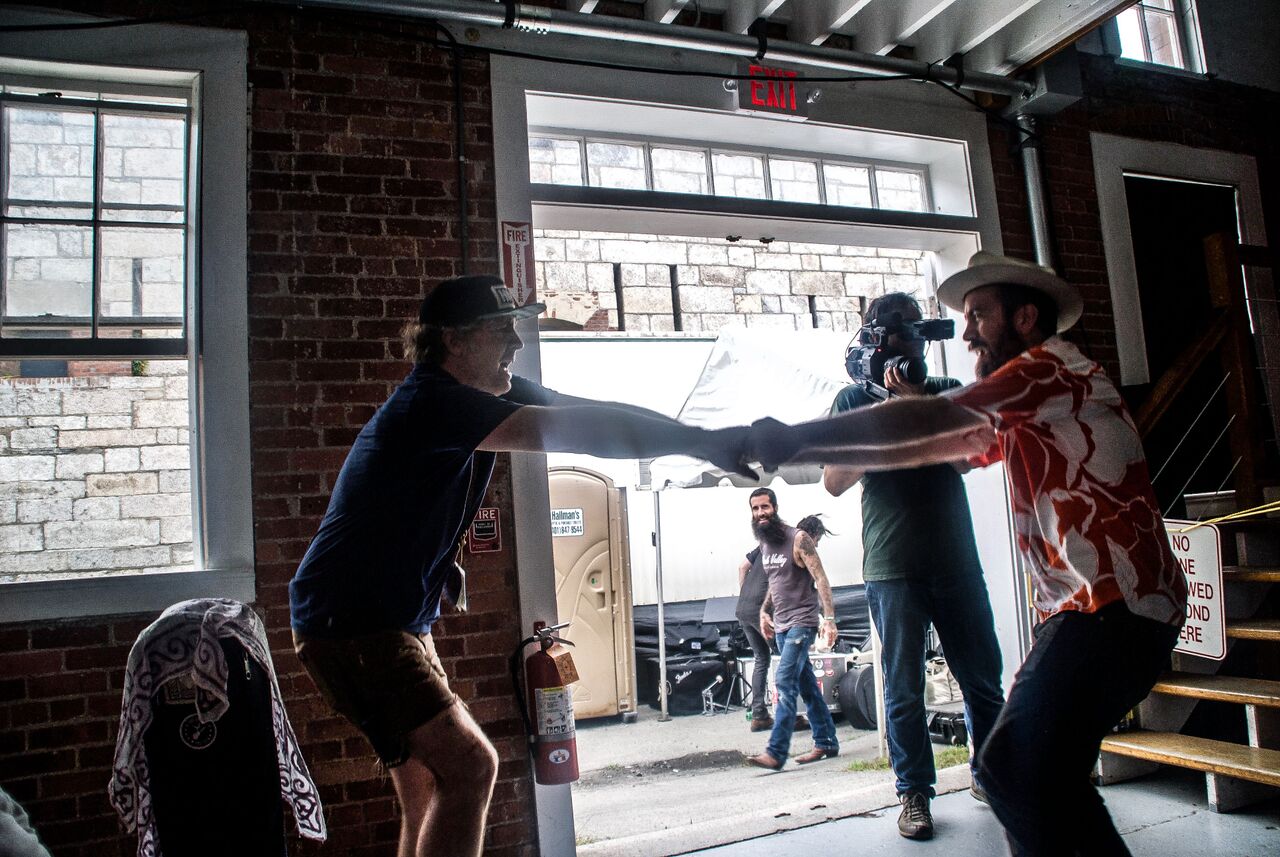Newport Folk Festival 2018: Let’s Get Together
About mid-way through a swampy, humid day on Friday at Newport, I experienced a very pointed case of FOMO: fear of missing out. It hit me right when I knew it would: St. Vincent on the Quad Stage, The Wood Brothers on the Harbor Stage, and Sturgill Simpson on the Fort Stage. But, as one person put it on twitter a week or so before the festival: conflicts are the sign of a good lineup, and I resolved right then to remind myself that less is more and to be where I could and not worry about where I wasn’t.
So, this recap of Newport is not so much about what I saw and heard as what I felt throughout the three days. A few themes stick with me now, a week or so removed from an incredible weekend. If you were there, we probably had pretty different experiences for the acts we got to hear, but maybe we had pretty similar experiences about these broad themes. And whether you were there or not, this is an invitation to create some of these feelings in small ways, wherever we find ourselves.
Speak Out
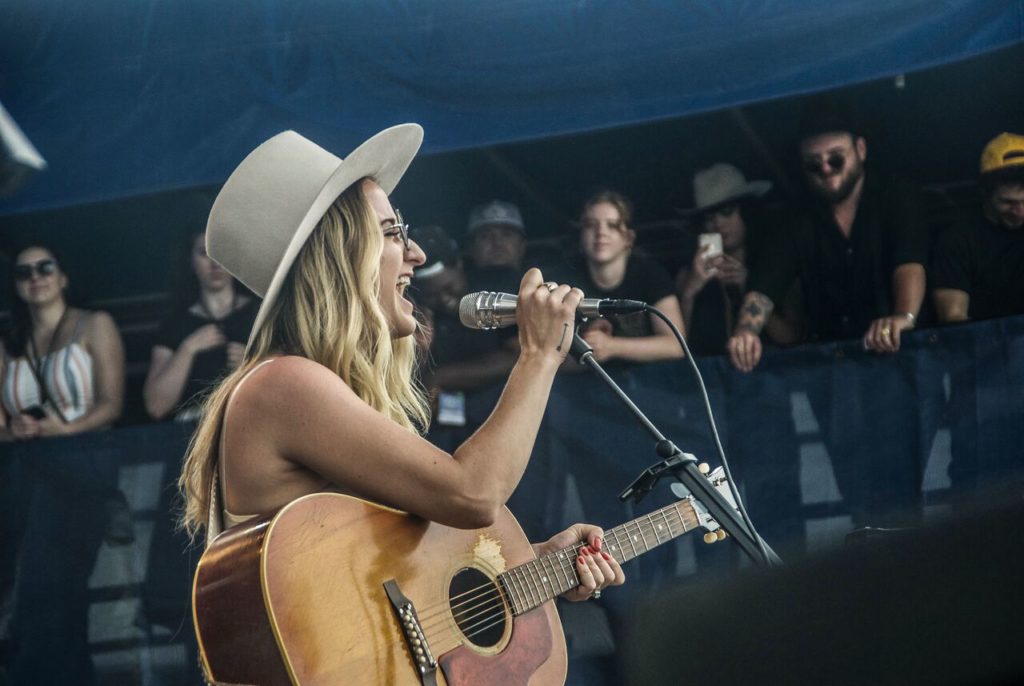
One of the signature sets of the 2017 festival was titled “Speak Out” and the responsibility of challenging the status quo was carried through this year. Shakey Graves’ entire band performed in matching “I Love Beto” t-shirts, supporting the candidacy of Beto O’Rourke to unseat Ted Cruz. Margo Price beautifully added to the lyrics of “All American Made,” singing: “I wonder how the President gets any sleep at night / And if the folks down on the border are making it alright / But I’m dreaming of that highway and it stretches out of sight / And it’s all American made.” Price commented that there aren’t many festivals where she can play that song. That is certainly an unfortunate commentary, and it’s also what sets Newport apart: there is an expectation among most audience members that artists will share their music and will share their beliefs. You can feel it, as the crowd gets quiet when an artist has something to say.
Jason Isbell, introducing surprise-guest David Crosby, commented that it is important to continue singing the songs that people wrote in previous generations, because they connect us and help us take up the work. Isbell’s own recent anthem, “White Man’s World,” reckons with the unearned privilege he has simply by virtue of being a white man. Crosby came on to huge applause and they launched into, “Wooden Ships,” which begins with lines that feel particularly relevant in a time of rising xenophobia: “If you smile at me, I will understand, / Because that is something everybody everywhere / Does in the same language.”
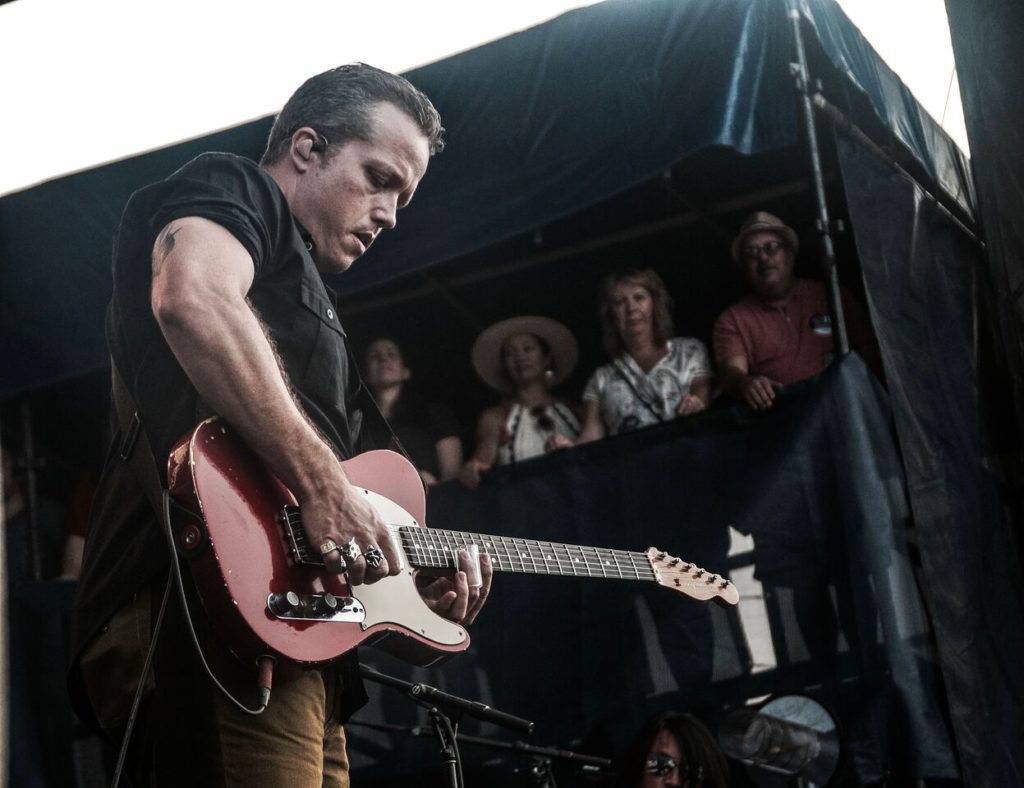
They followed with “Ohio,” and Crosby shouted, “Why? I want to know why!” in the closing moments of the song. Leon Bridges and Gary Clark, Jr. also performed “Ohio” in the closing set, “A Change is Gonna Come,” wringing out the mournfulness that is often lost in its pithy lyrics. I saw Neil Young a few weeks before, performing solo in Boston. When he introduced “Ohio,” you could feel the still-visceral reaction he had to the images of dead students at Kent State. He was twenty-five; he could have been one of those kids lying on the ground; he could have been one of those kids kneeling by their bodies. He could have been one of those kids and that’s where the power of that song comes from, at its core.
The closing set featured other covers of songs that fit Isbell’s description of connection to an earlier period of protest music, notably Sam Cooke’s “A Change Is Gonna Come,” sung by Rachel Price, and “The Times They Are A-Changin,” by Brandi Carlile, Maggie Rogers, and Chris Thile. God, that verse, “Come Senators, congressmen, please heed the call,” rings so damn true these days.
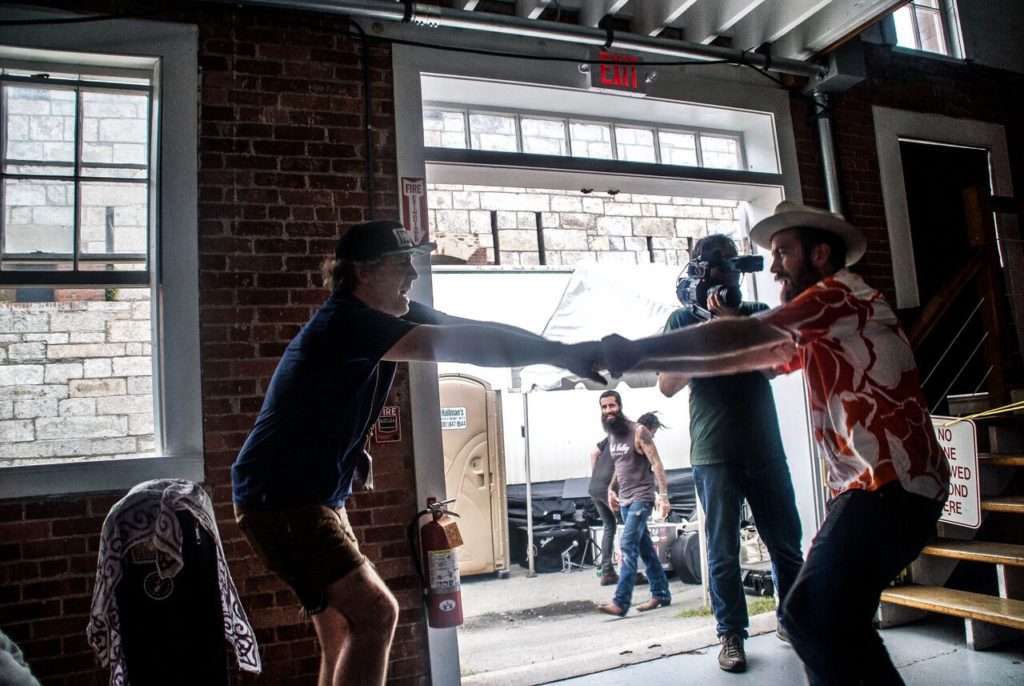
Gather. Celebrate. Let It Out.
It is critical to speak out and it is also important to feed your soul, and so this theme of coming together, being together, and celebrating together felt particularly important this year. There were so many sets defined by the energy that artists cultivated both on stage and in the crowd. Low Cut Connie started Saturday on the Quad Stage and everybody was immediately inducted into one sweaty, glorious dance party. Newport can sometimes be a little bit buttoned-up: most people are sitting down; it’s 11:00 a.m.; mostly-white folk/Americana crowds aren’t exactly known for their dancing. But, man, this crowd needed it, and you could tell how much we needed it when Adam Weiner, the front-man for Low Cut Connie, cut the music and spoke to the crowd: it was silent. No whoops or yells. Silent. Enthralled. And then, Bam! they kicked up again and it was more raucous than ever. There is only one word for the Low Cut Connie set: cathartic. I regretfully missed the Tank and The Bangas set, which, from what I understand, achieved that same feeling of tension and release.
If any set lived up to this feeling of energy on Friday, it was Sturgill Simpson. The man simply did not come to fuck around. He opened with a barn burning version of “Brace For Impact (Live A Little),” featuring huge guitar solos that seemed to be exorcising something for him. I feel like Sturgill always plays with a little bit of a chip on his shoulder, like he has to earn every performance, and man did he earn this one. At one point, he started a slower song (“All Around You”) and then felt like it wasn’t connecting, so he called it off halfway through and switched it up to “Call To Arms.” That kind of confidence is pretty rare and it translates into the crowd trusting the artist to read the room and do what’s necessary to achieve something truly special in the live experience.
But it was the Cook Brothers after show on Friday night that really solidified for me the power of gathering together. Part of it is just the kind of community experience that Phil Cook creates by sheer force of personality. When Phil and his killer band The Guitarheels started out on Friday, Phil looked across the stage at keys player James Wallace and said, “You’re too far away” and then mosied across the stage while playing the melody to their opening number, Randy Newman’s “He Gives Us All His Love,” which Phil sang replacing each “he” with “she.” There have been many comments about this night of music that have listed the incredible list of guests; it is totally right to celebrate that. But Phil, James, Michael Libramento (bass), and JT Bates (drums) have not gotten nearly the amount of praise they deserve for their work making this night so special. They played four songs from Phil’s newest record, one of my favorites of 2018, People Are My Drug, and, after Phil implored the white community to really listen to people of color about their experiences in America, played a gorgeous version of “Sail Away,” another Randy Newman tune. This was, in the parlance of anti-racism, calling people in not calling people out.
So Phil at the Guitarheels set the table and then made space for a whole bunch of friends to come and make a joyful noise. I loved John Prine’s duets with Amanda Shires (“Clocks and Spoons”), Margo Price (“Unwed Fathers”), and Brandi Carlile (“Summer’s End”). I loved that when Moses Sumney showed up, they chucked him on stage with someone else’s guitar. And then he redefined Ray Lamontagne’s “All The Wild Horses.” And no matter how you feel about Mumford and Sons, there is no denying that those guys create incredible opportunities for artists to connect and share with each other, and that there is zero ego involved. And that’s a big part of this sense of gathering–making people welcome, bringing people in, making space, checking egos, fostering humor and good will and kindness.
All About Family
There was a strong sense of family and its importance at Newport. There were fantastic examples of “chosen family.” Hiss Golden Messenger is a perfect example of this, made so clear by the set Mike Taylor and Phil Cook did in the Late July Family tent. Bermuda Triangle’s amazing set on Sunday was another wonderful example: Brittany Howard, Becca Mancari, and Jesse Lafser have the casual ease of sisters.
One of my favorite sets of the weekend was Glorietta, a band that has a chosen family feel to it. Honestly, I expected this set to be good music, because of the players involved; it was so much more than good music. It was transformative. Matthew Logan Vasquez, Kelsey Wilson, David Ramirez, Noah Gunderson, Jason Robert Blum, and Adrian Quesada made the Quad Stage feel like a family reunion where everyone actually likes each other. I found myself dancing with people I didn’t know to Vasquez’s song “Red Fish” and falling quiet for Ramirez’s beautiful new song, “Someday.” This is my new favorite band and was a set that I feel so damn lucky to have seen.
But there were also family-families playing a whole bunch of music over the weekend. Courtney Barnett accompanied her wife Jen Cloher for Cloher’s phenomenal Sunday set. During Amanda Shires’s jumping set on Friday, where she debuted quite a bit from her wonderful new record, To The Sunset, she said, “How about we get Mr. Shires up here?” Jason Isbell got up on stage and this led to one of my favorite interactions of the weekend: Jason took a couple quick strums to soundcheck and it was pretty loud; Amanda said to the sound guy, “I’d like less of that for me, Greg.” So good.
And then two instances of given-families had me just weeping. The first was Patrick Haggerty, who released the first gay country album with Lavender Country in 1972. First off, this set was fucking awesome. JP Harris set a great tone with Ned Sublette’s song, “Cowboys Are Frequently Secretly Fond Of Each Other,” and then he brought out Haggerty to rousing applause. They played, “Lavender Country,” and then “Straight White Patterns.” But it was Haggerty’s reflection on his father that brought me to tears. If you haven’t listened to Haggerty recounting his father’s unconditional love for him on NPR, please, please, please listen to “Don’t Sneak” immediately. He told a different story at Newport, but the upshot was the same: love your kids, know them and trust that they know who they are, treat them with respect, listen well, never let them doubt that you will be there for them.
The second given-family tear-jerker was Langhorne Slim on Sunday. Slim invited his mother up to the stage. He thanked her for raising him and his brother as a single mom, but also for fixing up an old guitar for him, and never telling him to stop playing drums or to stop pursuing music. “I’d be in big trouble,” if it wasn’t for music, Slim said. “I’m in a little trouble now, but I’d be in big trouble without this.” And then he thanked Jay Sweet for cultivating a place where people like him, “People who never fit in anywhere,” could find a home. It was so raw and genuine and vulnerable and real. Then, they sang, “Diamonds and Gold,” the first song he’d ever played for her that made her cry. I was just weeping. God, I’m tearing up thinking about it.
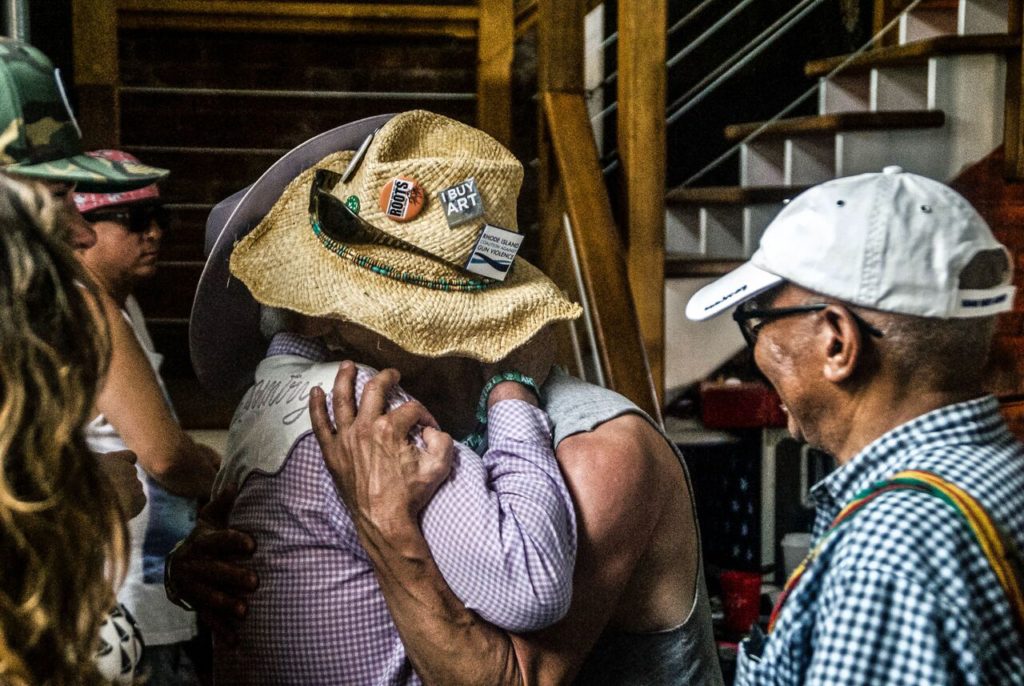
Everything is Connected
The final reflection for me on Newport 2018 was this deep sense of interconnectedness. This idea builds of Isbell’s sentiment shared earlier: the importance of understanding where our music comes from. The “Outside Folk” set that JP Harris curated might have been the clearest example of this. Having Matt The Electrician and Chris Smither share the stage, or Ramsay Midwood and Jonathan Tyler ripping one number after another, was not only damn cool, it underscored an intergenerational respect that is sometimes not understood by the audience. (I’ll never forget seeing JP Harris watch Terry Allen play “Amarillo Highway” a few years ago in the Museum; rapt attention greatly under-describes it.)
Nels Cline framed his entire set around a connection through a 1937 National guitar once owned by Curtis Rogers. It was amazing, and Brandon Seabrook blew away the crowd with his virtuosity and utterly idiosyncratic playing on guitar, mandolin, and banjo. It was also incredibly special that Nels asked Warren Haynes to join him on a few songs, including the folk-circuit standard, “Early Morning Rain.” On another stage, Charlie Parr invoked Spider John Koerner and ripped through a set of traditional blues and originals that resulted in a long standing ovation for him and his washboard player Mikkel Beckman. Charlie recently reflected on his performance:
“I didn’t feel the ghosts of my heroes at the festival, although I did feel the immense weight of their shoulders underneath me, holding me up into an atmosphere that I never could achieve without them. If I’m doing a good job, though, I feel this way every time I get to play. This festival … was an integral part of bringing the musicians that I love out of relative obscurity and onto a larger stage. I doubt that I would have access to a lot of the music I listen to today if it hadn’t been for the careful curation of the Newport Folk Festival. When I arrived at the festival, I wondered why I didn’t feel changed by it. What I had forgotten was that I had already been changed by it, decades before, when it brought me to the shoulders that I would stand on from the Harbor Stage overlooking Newport.”
While I don’t pretend to have much access to experiential planes beyond what I can see and hear and touch, Valerie June’s mesmerizing set had me thinking hard about how we are connected in ways that we can’t trace. June described us all as light that is temporarily in bodies. And that part of our work in these bodies is to share our light. She sure as hell did on the Fort Stage and I felt transported, just closing my eyes, listening to her stunning version of “Love You Once Made.”
And this idea of connection brings us back around to Phil Cook. To see him performing alongside Mavis Staples was a beautiful thing. If you know anything about Phil, you know that the Staples Singers have been a huge inspiration for him. What a beautiful sight to see him on that stage with her. In the liner notes for People Are My Drug, he thanks a host of musicians, including the Staples, Aretha, Donny Hathaway, and many more; he writes: “I stand not on your shoulders, but at your feet.” Amen.
“People Think This Stuff Just Happens.” I read in Rick Massimo’s excellent history of the Festival that George Wein told Rick, “People think this stuff just happens.” I hope everyone who worked the festival–from the volunteers roasting in swampy, humid conditions and never losing their cool to the sound crew who did amazing work all weekend long to the Newport Festival Foundation employees who have worked for months to bring all of this together–know that we know it doesn’t just happen. But moreover, I hope they all know the gratitude for this festival is deep. It’s sustaining. It’s soul-giving. When thanking Jay Sweet from the stage, MC Taylor said, “Musicians generally run on bags of Doritos and hope. Weekends like this are helpful.” On twitter, I noticed a bunch of people lamenting “Newport withdrawal.” I felt that too. But here’s where I am: don’t withdraw; connect. Gather and celebrate. Listen to people making music today; find the connections to the artists who inspired them and paved the way. Hug your family–given and chosen. Speak out. Make the change that has got to come.
See you at the Fort in 2019.

